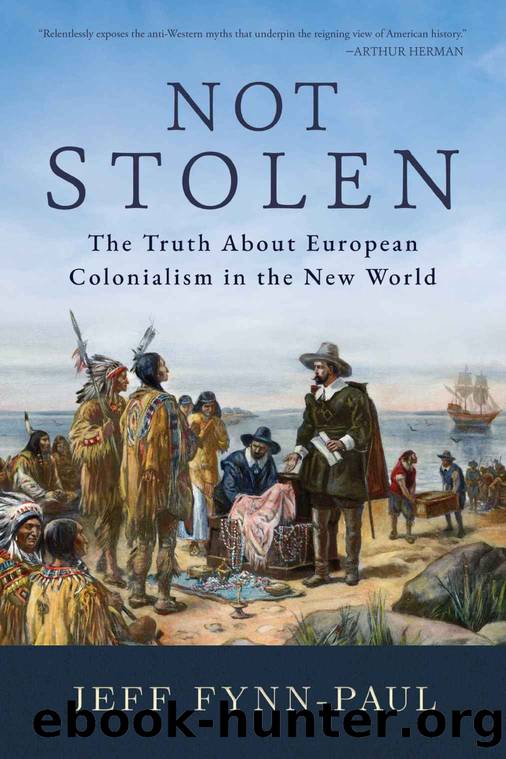Not Stolen: The Truth About European Colonialism in the New World by Jeff Fynn-Paul

Author:Jeff Fynn-Paul [Fynn-Paul, Jeff]
Language: eng
Format: epub
Tags: History, North America, Political Science, Colonialism & Post-Colonialism, Commentary & Opinion
ISBN: 9781642939521
Google: Cfu8EAAAQBAJ
Publisher: Simon and Schuster
Published: 2023-09-19T04:00:00+00:00
III
American Displacement
Chapter 11
Is Thanksgiving Racist?
Trudging through the Wampanoagâs summer villages and burial grounds, [the Pilgrims] rummaged houses, unearthed graves, and picked through funerary offerings. Their next move was to loot the Wampanoagâs stockpiles of food. The English credited âGodâs good providenceâ for this supposed discovery, explaining that because they had nothing to plant the next year, âthey might have starvedâ if they had not taken this measure. Just days into their American venture, the English had already established themselves as rotten guests.
âDavid Silverman, This Land Is Their Land
In the past several decades, a small but determined faction of killjoys have made it their business to eviscerate the American holiday calendar. The so-called âwar on holidaysâ has put increasing pressure on school boards to end school-sponsored festivities that do not âincludeâ everyone.
Even Valentineâs Day is now under attackâon February 13, Hillary Clinton sent around a âHappy Galentines Dayâ message to her millions of followers. Thinking this was a typo, I looked it up, only to find that some radical feminists found Valentineâs Day too âheteronormativeâ for their taste. They preferred to celebrate a separate holiday that excludes males altogether. So much for inclusivity.
The war on holidays originates with similarly fringe segments of the population: people who would rather see old traditions scrapped than adapt them to modern sensibilities. Such impulses are selfish and novelâa symptom of our historically myopic âme firstâ culture, whose instinct is to fragment social cohesion rather than promote it. For centuries, immigrant communities made it their business to adapt to the customs of their new homelands with a minimum of fuss. They did this in the understanding that community, and the rituals that hold it together, is at least as important as individual sensibilities.
Not so long ago, Thanksgiving was mostly just âTurkey Dayââan excuse to set a grand feast, watch parades on TV, and savor the only four-day weekend sanctioned by American law. The myths around it were mostly concocted for elementary school children, and the goal was to teach something edifying about the American project as a whole. Today, Thanksgiving has become a political battlefield, like everything else in our collective culture. Fabricated as it was during the nineteenth century, the Thanksgiving story weâve inherited is a minefield of potential multicultural offense.
The historical basis for Thanksgiving rests on a handful of sentences scribbled by the Plymouth colonist Edward Winslow. He notes that in 1621, Governor William Bradford invited the Wampanoag chief Massasoit and his people to a three-day harvest festival. Winslow notes how â[with] many of the Indians coming among usâ¦we [engaged in] recreationsâ¦[and] entertained and feasted with them.â He further describes how the Indians âwent out and killed five Deer, which they brought to the Plantation and bestowed on our Governor, and upon the Captain (Miles Standish), and others.â The celebration was held partly in gratitude to friendly Indians such as Squanto, who helped teach the settlers how to grow crops in their new environment. Such harvest festivals were a feature both of Indian and
Download
This site does not store any files on its server. We only index and link to content provided by other sites. Please contact the content providers to delete copyright contents if any and email us, we'll remove relevant links or contents immediately.
The Secret History by Donna Tartt(19089)
The Social Justice Warrior Handbook by Lisa De Pasquale(12190)
Thirteen Reasons Why by Jay Asher(8910)
This Is How You Lose Her by Junot Diaz(6887)
Weapons of Math Destruction by Cathy O'Neil(6280)
Zero to One by Peter Thiel(5802)
Beartown by Fredrik Backman(5754)
The Myth of the Strong Leader by Archie Brown(5508)
The Fire Next Time by James Baldwin(5446)
How Democracies Die by Steven Levitsky & Daniel Ziblatt(5219)
Promise Me, Dad by Joe Biden(5153)
Stone's Rules by Roger Stone(5088)
A Higher Loyalty: Truth, Lies, and Leadership by James Comey(4964)
100 Deadly Skills by Clint Emerson(4925)
Rise and Kill First by Ronen Bergman(4789)
Secrecy World by Jake Bernstein(4753)
The David Icke Guide to the Global Conspiracy (and how to end it) by David Icke(4720)
The Farm by Tom Rob Smith(4513)
The Doomsday Machine by Daniel Ellsberg(4490)
